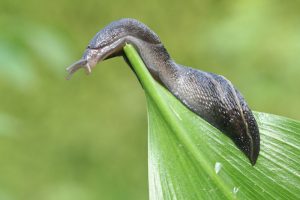How to Control Slugs in the Garden: Effective Methods for a Healthy Garden

Slugs are one of the most common garden pests, often causing damage with their chewing mouthparts. They create large, irregular holes in leaves, especially targeting tender plants like hostas, seedlings, and ground-hugging fruits. If you’re struggling with slug damage, using a combination of control methods is typically the most effective approach.
What Are Slugs?
Slugs are shell-less relatives of snails that feed on both living and decaying plant matter. They prefer moist environments and thrive in gardens with ample hiding places like stones, debris, and dense mulches. While they favor tender plants, slugs can feed on nearly anything, making them a challenging garden pest.
Effective Methods for Controlling Slugs
1. Cultural Controls
Minimize slug hiding spots by removing stones, debris, and weeds. Opt for plants less prone to slug damage and open garden areas to sunlight and airflow, which deters slugs.
2. Handpicking and Trapping
For an immediate solution, try handpicking slugs at night using a flashlight. Water the area beforehand to encourage slugs to emerge. Traps like inverted melon rinds or grapefruit halves are also effective—just scrape off slugs daily and dispose of them. For beer-baited traps, bury a tuna can in the soil and fill it with nonalcoholic beer to attract and drown slugs.
3. Physical Barriers
Use copper barriers around garden beds to repel slugs, as they dislike crawling over copper. Coarse sand, crushed eggshells, or coffee grounds around plants also create barriers, while Diatomaceous Earth sprinkled on soil or foliage will slice and dehydrate slugs as they crawl over it.
4. Natural Slug-Repelling Herbs
Certain herbs may deter slugs, including anise, lavender, wormwood, mint, cilantro, tansy, and lemon balm. Plant these around susceptible plants as a natural repellent.
5. Slug Baits
Slug baits like Sluggo and SlugMagic are highly effective and safe for use around children, pets, and wildlife. For added safety, make a DIY bait container by cutting a 2-liter bottle in half, inverting the top, and placing bait inside to keep it away from children and animals.
6. Natural Predators
Encourage natural slug predators such as ducks, chickens, snakes, toads, turtles, birds, beetles, spiders, ants, and firefly larvae to help control slug populations.
Always follow label directions on any product used in the garden. Control results may vary, and it’s unlikely to achieve 100% slug eradication. Avoid using salt in your soil, as it can harm plants and soil health.
Need Help with Slugs in the Garden?
Our garden experts are here to answer your questions and provide more helpful tips. For more gardening advice, click here.
Resources: OSU Extension Service